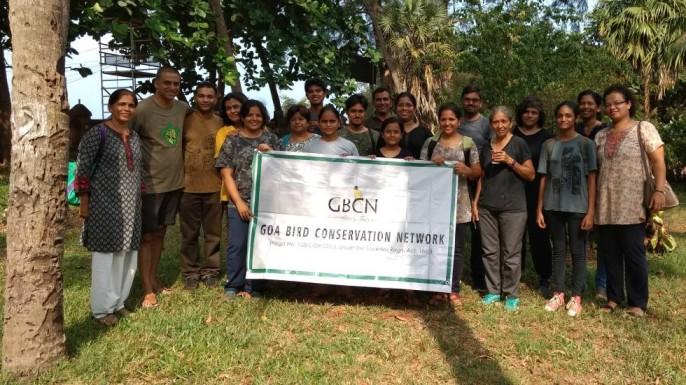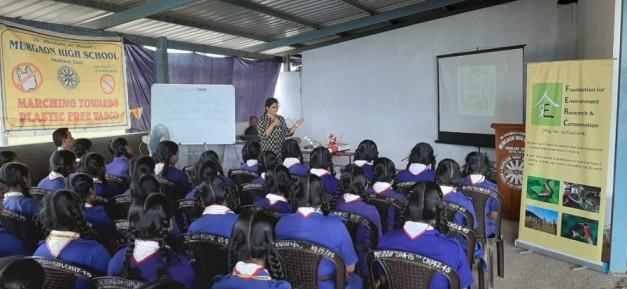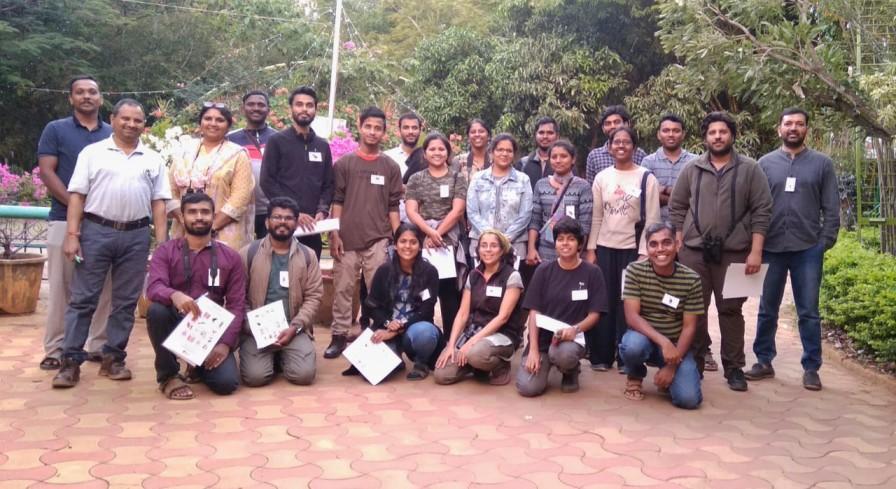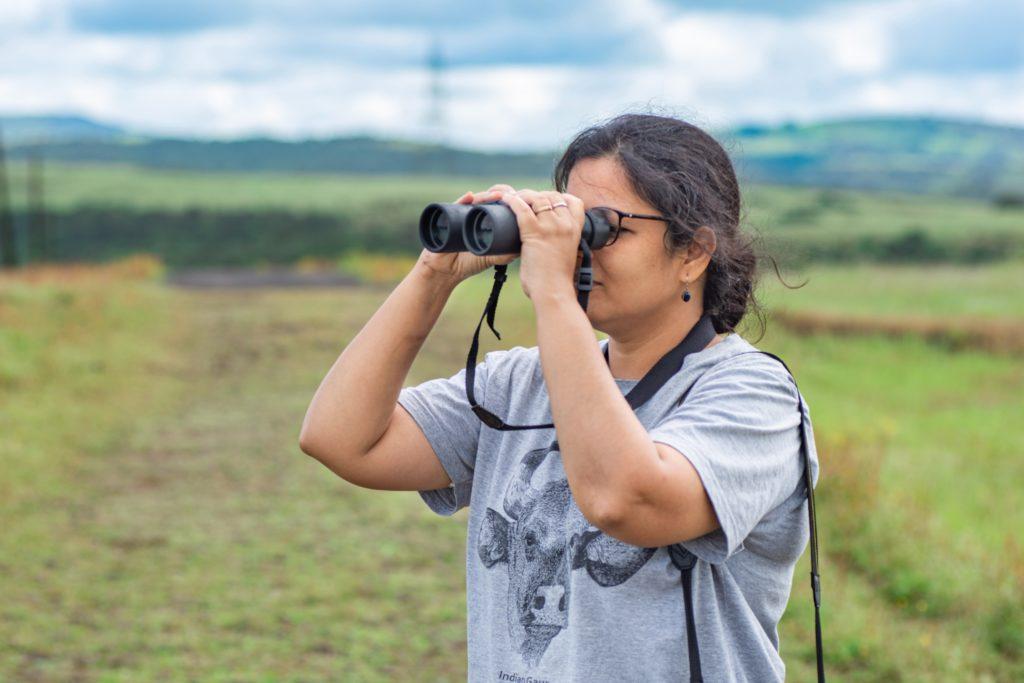Meet an Educator is a monthly series by Early Bird, where we feature the work of educators across India who are actively spreading the joy of birds and nature. This month’s featured educator is Shraddha Rangnekar, an educator from Goa. She organises experiential learning programs for school and college students as well as the public at large.
Do tell us about yourself
I am Shraddha Rangnekar, Masters in Zoology from Goa University and currently a Partner with an ecotourism initiative called Mrugaya Xpeditions based out of Goa. My work includes organising experiential learning programs for our guests, who primarily include school and college students as well as the public at large. The activities often include natural history exploration including popularising the joys of birding in Goa and the mighty Sahyadris. I am also the Founder Member of the Foundation for Environment Research and Conservation (FERC). Both at Mrugaya Xpeditions and FERC, our team has constantly thrived to bring the communities in Goa on board, strengthen their traditional knowledge practices and understanding of nature. We also train youth and women to be naturalists and bird guides in the field of community ecotourism initiatives.
I was born and brought up in Goa in a small town called Vasco da Gama, amongst the hustle and bustle of a typical city.
Are you a birder? What about bird watching excites you?
Yes, I am an ardent birder and I love everything about bird watching. Right from observing birds in my backyard to exploring the forests in Goa and other parts of India for birds, all of it equally excites me. Watching shore/wetland birds and the raptors fascinates me the most.

When and how did you get interested in bird/ nature education?
I grew up in Goa which is famous for its beaches. As a child I would often explore the sandy and rocky shores of Goa along with my parents and siblings. Occasionally we would visit the hinterlands. Though not very famous for its forests and its denizens back then, I was always in awe of the mountains and the forests. Whenever I got the opportunity to visit these areas, I would instantly connect with it. It was during my undergraduate course that I chose Zoology as a special subject, before which it wasn’t on the cards. While pursuing the course, I came across a lot of people who got me interested in the wonders of nature. For obvious reasons, I didn’t want to keep all of the experiences restricted to myself and wanted to share the knowledge with people of all walks of life. I started to volunteer with different nature clubs and organisations like WWF, Vivekanand Environment Awareness Brigade (organisation based out of Goa), Mineral foundation of Goa (I volunteered for their nature education programs for more than 1.5 decade) that often conducted basic nature-related outreach and awareness activities.
What do you hope to achieve through your education work?
I always believed in the saying ‘be a part of the solution, not the problem’. With this philosophy in life, I kept myself motivated to look for new ways to connect with people, to make them aware of the different environmental issues and encourage them to be a part of the change in whatever small or big ways possible. My sole objective while I am engaged in my work is to foster an informed society that would take the decisions based on the right information and knowledge that would translate into sound action.
Why do you believe it is important for children to learn about birds or connect with nature?
The benefits of being able to connect with nature and its denizens are boundless. With current situations where we find children more and more confined indoors and a complete disconnect with their immediate surroundings, it is very essential and crucial to get children to rebuild their connections with the world beyond the virtual world.

Nature exploration, especially observing the birds and butterflies, often triggers curiosity in young minds and cultivates a sense of empathy towards living beings. Unless the kids experience all of it themselves, they will never appreciate their bond with nature.
What tools or resources have helped you in teaching about birds?
It’s always fun to be with kids in nature, it adds more positivity to the whole experience since kids are not judgemental about things. I think just a nature walk along a shore, a lake, in a forest or the backyard have proven the best way to get not only children but everybody to connect with nature well. With the most basic gadgets available like the binoculars or a spotting scope, and keeping a field guide handy has always helped me to hook my guests and keep them interested in the subject.
Besides, I include a lot of nature games like scavenger hunt, tell tale signs, birds of the trail that helps me keep the enthusiasm going during my nature walks. When indoors, I include a lot of audio-visual screenings consisting of small and simple videos and documentaries that help me strike a conversation with the participants.

Have you encountered a significant challenge as a bird/nature educator, how did you overcome it?
A significant challenge, that I have encountered on many occasions during guided trips at my work have found people especially the ‘pseudo birders’ (a term I use for people who are not interested in the true joys of birding but just want to be in the rat race of having the maximum photographs of bird species) end up getting too close which poses a significant threat to the bird. They might also indulge in wrong practices like playing recorded calls of range restricted or rare bird species in spite of frequently reminding and instructing them on the basics of ethical birding. Such a nature of birding has often created negative impacts on the whole birding experience.
Do share any memorable moment or experience you have had in teaching kids about birds/nature.
Every moment spent with the kids in nature has been wonderful. Nature surprises us in many ways and so do the kids too! Kids are fast learners and are never judgmental about things around, that’s what fascinates me the most. It’s this very positive attitude of children towards any issues that have kept me going in this field as a nature educator and conservationist for more than two decades now.

Have you noticed any changes in your learners after they received exposure to birds and nature-based learning?
Oh yes! Definitely. There is no one I guess who has gone home unsatisfied or untouched by the wonders of nature. I have seen children become more sensitive, connect better to nature as well as a change in their attitudes; which to me is testimony to the impact this type of education has had.
What message would you have for your fellow educators, or somebody starting out in their nature education journey?
All of us as educators are unique in our own way. I don’t have any particular message or tips to give. As an educator I have often come across some exceptional and promising days while some days that have brought with it disappointing moments (the blatant violations of environmental ethics), however bad it may have been, keep your focus, perseverance and dedication going. Never cease your creativity, shy away from challenges or from exploring new possibilities.


Well done. Keep up the good work. Your effort will benefit all on the Big Blue.
i discovered a new english word for u, n it is “connbected” #
# It means ,ur just not connected to nature to protect it but ur making a simple living out of it for ur survival n dat is ur debt so ‘Connbected’ The least i can say ‘Wish u all the Success’
Proud of you